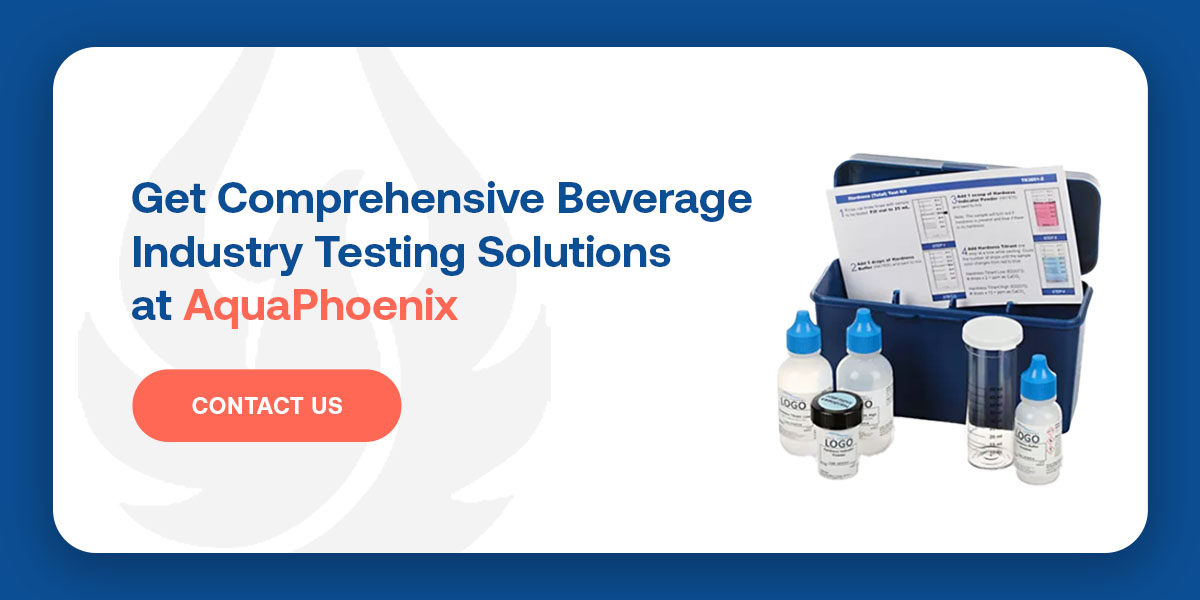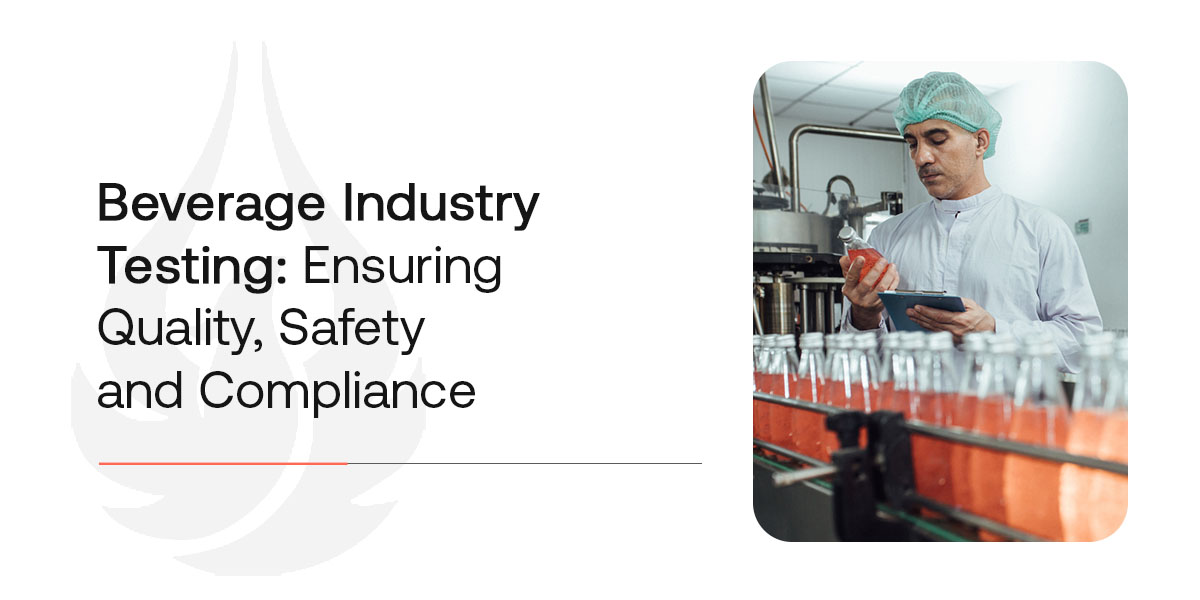Testing for the beverage industry helps maintain product quality, safety and regulatory compliance. Whether you’re managing process water for a large-scale beverage plant or ensuring the integrity of your equipment, you’ll need to regularly test for contaminants, pH and microbial threats. Testing will help you avoid unplanned shutdowns and regulatory violations. It also keeps filtration and other bottling equipment running smoothly and your products safe and high-quality.
In this article, we will discuss how beverage industry testing works, outline the common tests and explain how to build a quality testing program to support operational efficiency and compliance.
Understanding Quality Tests in the Beverage Industry
Industrial beverage producers face unique challenges since water quality directly impacts the safety of their products, the performance of their equipment and their regulatory standing. Water is the main ingredient in most beverages, from bottled water to beer, soda and juice, and its quality directly affects the safety, taste and consistency of the final product.
However, contaminants like microbes, heavy metals and chemicals can get into water and ruin batches. They can also damage equipment and lead to costly breakdowns or regulatory violations. As such, it’s important to test process water before it is used in production.
Standard tests in the beverage industry include microbiological, chemical and water testing, all designed to protect your products and processes. Whether you’re running a brewery, bottling facility or a juice plant, you’ll need to regularly check for common contaminants and meet the standards set by regulatory bodies.
Importance of Beverage Quality Testing
Regular testing can help you keep unsafe products from the market and prevent delays. It can also help you avoid audit challenges and costly equipment repairs. Here are the top reasons to regularly test your water and beverages.
1. Maintaining Product Safety and Consumer Health
Regular beverage testing will identify harmful contaminants, including:
- Pathogens, such as E. coli, salmonella and listeria.
- Heavy metals.
- Ammonia.
- pH imbalance.
- Total dissolved solids (TDS).
- Chemical residues.
All of these contaminants can pose health risks for consumers. Regular testing keeps unsafe products from reaching the market.
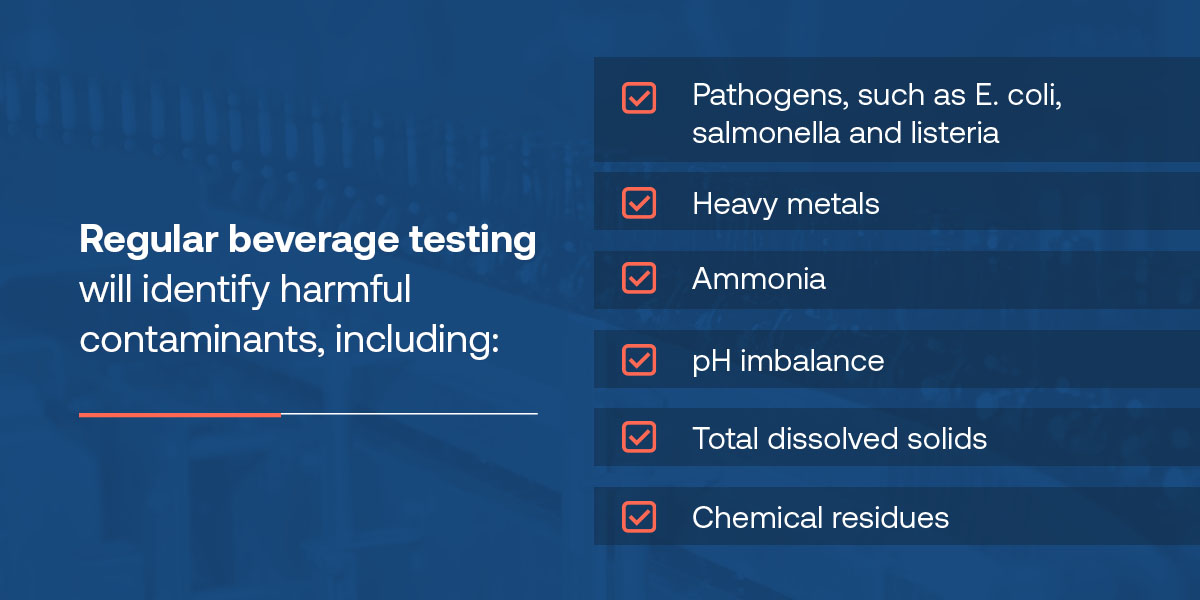
2. Meeting Regulatory and Quality Standards
The beverage industry must comply with strict regulations from the Federal Drug Administration (FDA), Alcohol and Tobacco Tax and Trade Bureau (TTB) and Environmental Protection Agency (EPA). It also must follow international standards like the International Organization for Standardization (ISO) and Hazard Analysis and Critical Control Points (HACCP).
You’ll need to meet these quality standards for the beverage industry. Testing demonstrates your compliance and helps you avoid fines, recalls and shutdowns.
3. Protecting Equipment and Operational Efficiency
Contaminants in process water can lead to scaling, corrosion and biofilm buildup in your filtration systems, bottling lines and other essential equipment. Routine testing finds these issues before they can occur, so you can address them early and avoid downtime or costly maintenance.
4. Safeguarding Brand Reputation and Customer Trust
Even just one quality incident or recall can affect your brand’s reputation and customer confidence. Through consistent beverage industry quality testing, you make sure all products meet safety, taste and appearance expectations. That way, you can keep your strong market position and continue putting out products that customers trust.
5. Supporting Continuous Improvement and Cost Control
Testing can give you the actionable data you need to adjust your processes for greater efficiency. The data can also show you areas where you can reduce waste and keep your products consistent. By spotting trends or issues before they occur, you can make more informed decisions for your operational efficiency and long-term profitability.
Types of Tests Performed
Most tests are standardized and required, while some are specialty tests for certain products. Water testing for beverage industry applications is especially crucial, since water is the foundation of every batch you make. Dairy testing also involves similar core tests to ensure safety and consistency.
Here are some of the common tests performed in the beverage industry.
Microbiological Testing
Microbiological tests detect harmful pathogens like E. coli, salmonella and listeria. These organisms can enter your production process through raw materials, water or the equipment itself, and even a small amount can lead to health risks and product recalls. Regular microbiological testing also looks for biofilm and microbial growth in your process water systems. Biofilms can form inside pipes and tanks, making them difficult to remove and increasing contamination risks throughout an entire facility.
Chemical and Physical Testing
Chemical and physical tests monitor key parameters, such as pH, dissolved solids, heavy metals, and whether a batch contains additives or preservatives. pH testing is especially important for water treatment because it impacts both product quality and equipment performance. A sensory analysis evaluates the taste, odor and appearance of beverages. It makes sure your water and finished product meet your customers’ expectations and regulatory requirements in the beverage industry.
Water Testing for the Beverage Industry
Water quality testing is necessary for both the product and your process. Poor water quality can introduce contaminants, impact the flavor of the beverage and damage equipment. Critical water tests include:
- Microbial counts.
- Chemical analysis for substances like chlorine or heavy metals.
- Mineral count checks.
Routine water testing helps you catch problems early, maintain compliance and protect your brand reputation.
Testing for Breweries and Specialty Beverages
Breweries and specialty beverage producers must conduct standard microbiological and chemical tests in addition to specific ones. For example, breweries need to measure bitterness, gluten content and diacetyl levels to ensure consistency and meet labeling requirements. These regular tests help deliver safe, high-quality products.
How to Build a Beverage Quality Testing Program: Step-by-Step Guide
You need a strong beverage quality testing program to comply with industry regulations, protect your equipment and continue delivering consistent products to your customers. The following approach will help you identify gaps, choose the right tests and ensure best practices.
1. Assess Your Current Water and Beverage Testing Capabilities
Start with an audit of your existing testing processes. Review the tests you’re already performing, how often you conduct them and who is responsible for each step.
Next, look for gaps in your coverage. Determine if there are any contaminants or parameters you’re not monitoring. Also, make sure your methods are up to date according to current industry standards. Then, you can consider whether you’re testing your beverages frequently enough for your production volume and risk profile.
By thoroughly assessing your current processes, you can better see where to make improvements. This first step will set the foundation for an effective testing program.
2. Choose the Right Tests for Your Product, Process, and Equipment
The next step is to match your testing program to your specific needs. Choosing the right tests will help you target risks most relevant to your operation and avoid unnecessary costs. Consider these three factors to choose tests:
- Type of beverage you produce
- Your water source
- The scale of your operation
For instance, if you’re responsible for a brewery operation, you might need to test for bitterness and gluten. Calcium can affect the yeast, while sulfates can add to bitterness.
If you run a bottling plant, you’ll need to focus on microbial and chemical contaminants. Review regulatory requirements for your industry, such as FDA or TTB standards, to ensure you’re meeting the right guidelines.
3. Implement a Sampling Plan
To get reliable results from your tests, you’ll need to design a strong sampling plan. Determine how often and at what point in your process you’ll collect samples and how you’ll document each test.
For example, a brewery might sample water at the intake, after filtration and in the final product. In contrast, an industrial water treatment facility would likely focus on key points throughout the distribution system.
Batch sampling will help you catch issues early and maintain a traceable path throughout your entire operation. Make sure you document every single sample, including the date, time, location and results, for compliance purposes and troubleshooting.
4. Choose Testing Methods and Technologies
Next, decide whether you’ll conduct tests in-house, use a third-party lab or both. In-house testing offers greater speed and control, while third-party labs have specialized expertise and independent verification that benefit many operations.
Consider technologies like rapid testing kits, automated analyzers and digital data management tools in your testing process. These tools can improve efficiency, make them less susceptible to human error and give you real-time insights into your testing process.
5. Establish Training and Quality Assurance
Your testing program is only as strong as the people running it. Invest in staff training to make sure that everyone understands proper sampling, testing and documentation procedures. You can also perform proficiency testing and ongoing quality assurance tests to make sure you’re catching any errors that could arise before they turn into problems.
Encourage your team to continually improve these quality tests, and to look for and address issues proactively.
6. Document for Compliance
Throughout the entire testing process, you’ll need to keep accurate records for traceability and audits. Document each test you perform and track the following:
- Results
- Corrective actions
- Any deviations from standard procedures
Documenting these items can support your compliance efforts and help you spot trends that could improve your processes.
Common Challenges in Beverage Testing
It’s common for facilities to deal with challenges related to beverage testing, like:
- Inconsistent sampling.
- Inadequate staff training.
- Poor documentation.
- Changing regulations.
- Relying on outdated methods.
- Failing to adjust testing frequency as your production scales up.
You can avoid these pitfalls by continuously reviewing your program and staying current on industry best practices. There are several industry resources you can use to design an effective testing program. You can also seek guidance from experts as you build or update your testing processes.
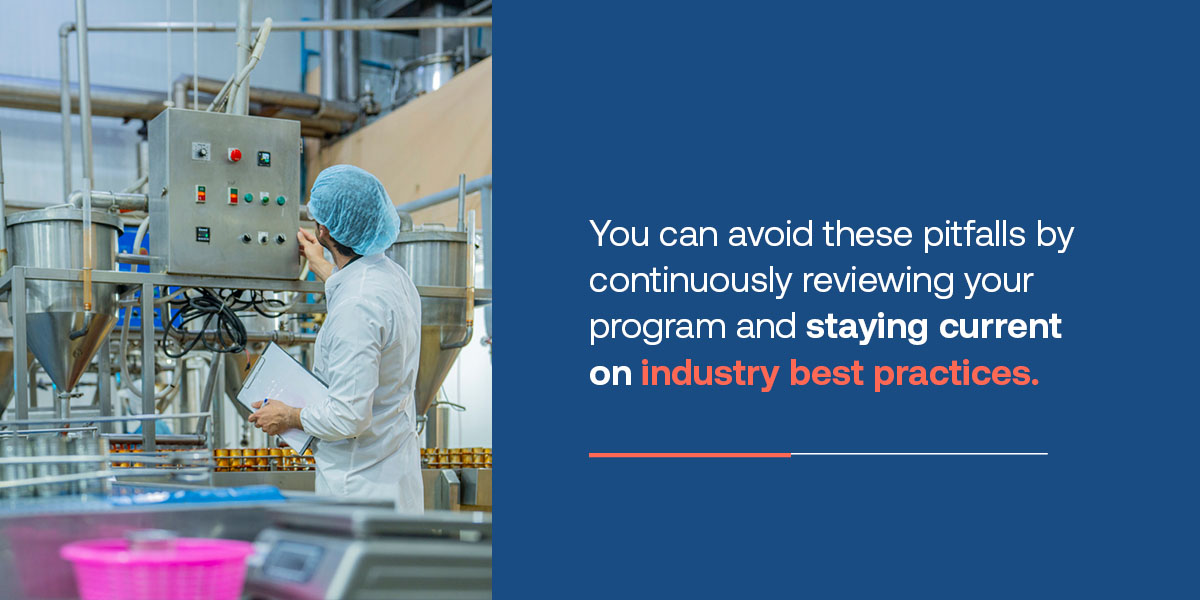
Benefits of Regular Beverage Quality Testing
Regular beverage quality testing offers several benefits.
Catch Problems Early
Routine testing detects contaminants, process deviations or equipment issues before they can impact your final product. Early detection means you can address any issues quickly, helping to minimize widespread contamination risks or production delays. That way, you can stay ahead of potential problems and ensure consistent product quality.
Avoid Costly Recalls
A single recall can affect your finances and reputation. A strong beverage industry quality testing program can act as a safeguard from these issues. By regularly testing for contaminants and other hazards, you ensure unsafe products never enter the market, helping you avoid the costs and disruption of product recalls.
Maintain Customer Trust
Your customers expect safe, high-quality beverages every time they purchase your product. Consistent testing shows your commitment to quality and safety. Beverages that are safe and consistently taste great help you build trust with your customers and partners.
Extend Equipment Life
Testing also protects your equipment. When you continually monitor your water quality, you can detect issues like scaling and biofilm buildup early. From there, you can prevent the buildup from damaging your filtration systems and other equipment. A proactive approach can extend your equipment’s lifespan and help you avoid downtime.
Support Continuous Improvement
Regular testing provides valuable data you can use to improve your processes and operations, from increasing efficiency to boosting consistency in your products. A strong testing program can support your long-term goals and help you stand out from the competition.
How to Choose a Testing Partner — Key Factors to Consider
Choosing a testing partner can affect every aspect of your beverage quality program. You’ll want to consider the expertise of the company you choose, looking for one that has the testing kits and supplies you need and also offers support services to help you succeed.
Consider these factors to choose the right beverage quality testing partner for your operation:
- Wide range of testing solutions: Choose a testing partner that has the kits you need for water, microbiological, chemical and specialty testing. That way, you can source all of your testing supplies from one trusted partner, making it easy to procure supplies and avoid administrative challenges.
- Speed and reliability: Downtime and delays can be costly, so you’ll need a partner that can get you the correct kits and supplies as quickly as possible. Choose a partner with rapid turnaround and responsive customer service so you can keep your operations running smoothly.
- Support and expertise: Look for a partner who offers technical support, training and guidance. They should be available to answer your questions, troubleshoot and show you how to adapt your testing to changing regulations or production needs.
- Flexibility and value-added services: All beverage operations are unique and have their own quality challenges. Choose a testing partner willing to create custom testing kits and instructions for your unique requirements.
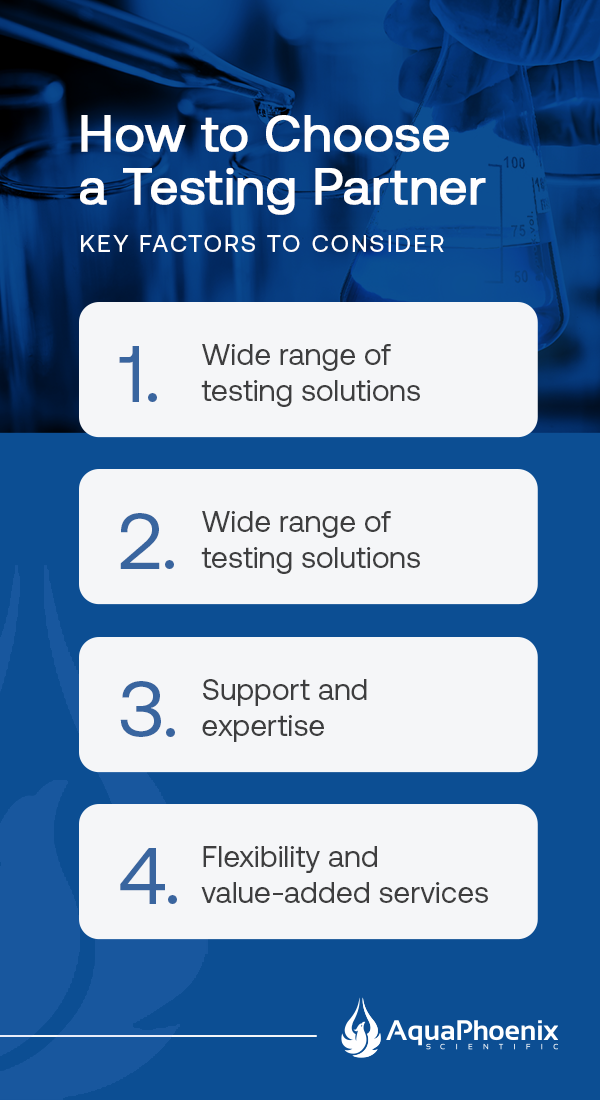
Get Comprehensive Beverage Industry Testing Solutions at AquaPhoenix
You need a strong beverage testing program and a reputable partner to help you deliver safe, high-quality and consistent products to your customers. At AquaPhoenix, we are dedicated to upholding the highest standards of safety, quality control and customer support, establishing us as industry leaders. Each of our quality control and assurance kits is developed and supported by experienced industry professionals, empowering customers to achieve excellence in their own operations.
Our team is always willing to go the extra mile for our clients, and we offer a breadth of testing options. Our EndPoint ID® and EndPoint ID® PLUS lines ensure you have everything you need for water, microbiological, chemical and specialty testing. We also provide fast deliveries, so you can rely on us for your testing needs.
Elevate your beverage production standards with AquaPhoenix. Contact us today to streamline your beverage and water testing program.
